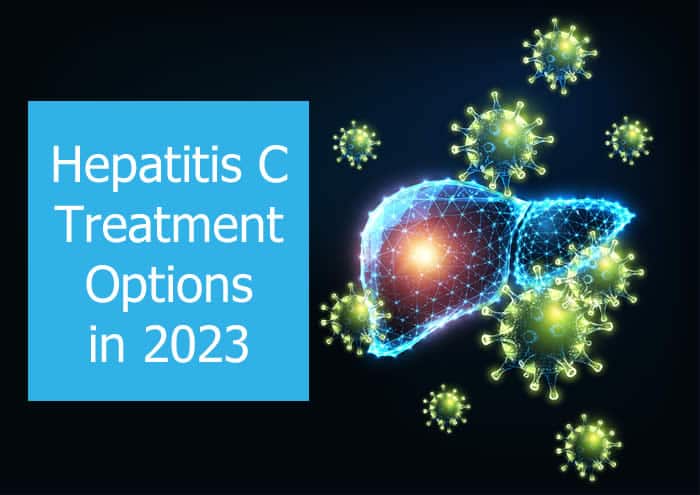Hepatitis C Treatment Options in 2023


Hepatitis C is highly curable. (1) That said, if you’ve been diagnosed with this virus-based liver inflammation, your treatment options can vary from one year to the next due to advances in research, medicines, medical equipment, and treatment techniques. With all these factors in mind, here are hepatitis C treatments available in 2023.
Options to Treat Hep C in 2023
Direct-Acting Antiviral Hepatitis C Medications
Research indicates that direct-acting antiviral (DAA) medications can effectively resolve the hepatitis C virus (HCV) more than 90% of the time. (2) This high success rate makes DAAs one of the first treatment choices.
Direct-acting antivirals are medications designed to keep the hepatitis C virus from replicating. They work by targeting the proteins that encode the virus, impacting their ability to reproduce. Treatment with DAA medicines ranges in length from 8 to 24 weeks, and they are available in pill form.
Taking two or more DAAs at the same time often leads to a more effective resolution of a hepatitis C infection. (3) First-line direct-acting antiviral medications that offer a combination approach to treatment include: (4)
- ledipasvir-sofosbuvir (Harvoni)
- elbasvir-grazoprevir (Zepatier)
- sofosbuvir-velpatasvir (Epclusa)
- sofosbuvir-velpatasvir-voxilaprevir (Vosevi)
- glecaprevir-pibrentasvir (Mavyret)
Interferon-Based Hepatitis C Therapies
Another medication option for treating hepatitis C is interferon (IFN)-based therapy. This type of medicine is delivered via a weekly injection versus taking a pill daily, which can be a challenge for some patients.
Other challenges associated with IFN-based hepatitis C treatments are: (5)
- the duration of treatment is generally much longer (around 48 weeks)
- these drugs can lead to more adverse side effects than those experienced with DAAs
- having pre-existing conditions may make patients ineligible for this type of treatment
- many patients don’t tolerate this treatment well
Despite this, there may be times when interferon therapy is recommended. For instance, research has found that IFN-based therapy is less likely to reactivate hepatitis B in patients who also have hepatitis C when compared to those receiving a DAA-based treatment, at 11.9% versus 21.1% respectively. (6)
Liver Transplant

If the hepatitis C infection is advanced, chronic, or involves serious complications, a liver transplant may be needed. Fortunately, this treatment option is becoming less necessary, due in large part to the high effectiveness of antivirals. (7)
Still, in cases where a liver transplant is required, hepatitis C is one of the most common reasons for this surgical procedure. (8) This involves getting on the transplant list, then finding a suitable donor. Liver donors can be living or deceased.
Having a living donor can shorten your time on the waitlist. (9) To qualify as a living donor, several conditions must be met. Among them are being between 18 and 65 years of age, having a body mass index under 33, and agreeing to avoid cigarettes and alcohol for at least six weeks before surgery.
Lifestyle Changes That Support Hepatitis C Treatment
Making certain lifestyle changes can also be beneficial when you have hepatitis C. Some of the changes recommended by Johns Hopkins include: (10)
- Stop drinking alcohol as this can be dangerous for someone with hep C
- Lose your excess weight since obesity can increase the speed at which the liver scars
- Get your vaccinations for hepatitis A and B if you don’t already have immunity to these diseases
Taking a dietary supplement may also improve liver health. For instance, carotenoids have been found to help protect the liver by reducing oxidative stress and regulating lipid metabolism. (11) Milk thistle also has protective properties, even helping to stimulate liver regeneration. (12)
The Future of Hepatitis C Treatment
What does hepatitis C treatment look like in the future? One potential remedy is nanomedicine.
Nanomedicine involves treating the patient on the molecular level. According to researchers, this type of medicine can help healthcare providers better target the liver, along with providing more sustainable treatment effects while limiting negative side effects. (13)
(1) Dennis, B., Naji, L., Jajarmi, Y., Ahmed, A., Kim, D. (2021, August 07). New Hope for Hepatitis C Virus: Summary of Global Epidemiologic Changes and Novel Innovations Over 20 Years. World Journal of Gastroenterology. doi:10.37489wjg.v27.i29.4818
(2) Baumert, T., Berg, T., Lim, J., Nelson, D. (2019, January). Status of Direct-Acting Antiviral Therapy for Hepatitis C Virus Infection and Remaining Challenges. Gastroenterology. doi:10.1053/j.gastro.2018.10.024
(3) Geddawy, A., Ibrahim, Y., Elbahie, N., Ibrahim, M. (2017, March). Direct Acting Anti-Hepatitis C Virus Drugs: Clinical Pharmacology and Future Direction. Journal of Translational Internal Medicine. doi:10.1515/jtim-2017-0007
(4) U.S. Department of Veterans Affairs. (2019, October 03). Classification of Direct-Acting Antiviral Agents in HCV Treatment Regimens. Retrieved January 09, 2023, from https://www.hepatitis.va.gov/hcv/treatment/hcv-daa-class.asp
(5) Pockros, P. (2013, October). Interferon-Free Regimens and Direct-Acting Antiviral Agents. Gastroenterology & Hepatology. Retrieved January 09, 2023, from https://www.ncbi.nlm.nih.gov/pmc/articles/PMC3992059/
(6) Jian, X., Ye, J., Li, Y., Li, L. (2018, July 28). Hepatitis B Reactivation in Patients Receiving Direct-Acting Antiviral Therapy or Interferon-Based Therapy for Hepatitis C: A systematic Review and Meta-Analysis. World Journal of Gastroenterology. doi:10.3748/wjg.v24.i28.3181
(7) Crismale, J., Ahmad, J. (2019, December 21). Expanding the Donor Pool: Hepatitis C, Hepatitis B and Human Immunodeficiency Virus-Positive Donors in Liver Transplantation. World Journal of Gastroenterology. doi:10.3748/wjg.v25.i47.6799
(8) Mayo Clinic. (2020, November 21). Liver Transplantation for Chronic Hepatitis C: How Common Is It? Retrieved January 09, 2023, from https://www.mayoclinic.org/diseases-conditions/hepatitis-c/expert-answers/liver-transplant-for-hepatitis-c/faq-20114794
(9) UCSF Health. (n.d.). Becoming a Living Liver Donor: What Is a Living Liver Donor? Retrieved January 09, 2023, from https://www.ucsfhealth.org/education/becoming-a-living-liver-donor
(10) Johns Hopkins Medicine. (n.d.). Hepatitis C Treatment. Retrieved January 09, 2023, from https://www.hopkinsmedicine.org/health/conditions-and-diseases/h/hepatitis/hepatitis-c/hepatitis-c-treatment
(11) Elvira-Torales, L., Garcia-Alonso, J., Periago-Castón, M. (2019, July 19). Nutritional Importance of Carotenoids and Their Effect on Liver Health: A Review. Antioxidants. doi:10.3390/antiox8070229
(12) Bhattacharya, S. (2020). Chapter 30 – Milk Thistle Seeds in Health. Nuts and Seeds in Health Disease Prevention (Second Edition). doi:10.1016/B978-0-12-8188553-7.00030-9
(13) Ellah, N., Tawfeek, H., John, J., Hetta, H. (2019, June 05). Nanomedicine as a Future Therapeutic Approach for Hepatitis C Virus. Future Medicine. doi:10.2217/nnm-2018-0348







